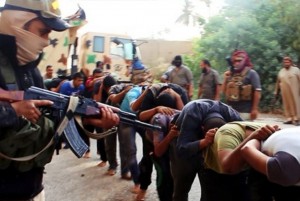
More than 100 angry relatives of Iraqi soldiers who were abducted by Islamic State militants in June have stormed the country’s parliament.
The crowd, mostly from Iraq’s Shi’ite majority, smashed some equipment, assaulted at least two staff members they mistook for lawmakers and were refusing to leave the building, said officials inside.
“They were ready to bulldoze anyone standing in front of them … They were saying ‘Our sons are buried in the dust. We don’t even know their names, and you are sitting here in comfort under the air conditioning’,” a parliament employee said.
“A special force unit came with batons to remove them from the parliament … I can hear screaming, shouting and name calling,” the employee added.
Islamic State fighters captured the soldiers in June at the start of its lightning advance through northern and central Iraq, where it declared an Islamic caliphate and threatened to march on Baghdad.
The soldiers walked out of their base in Tikrit, north of the capital, believing a truce had been brokered. Instead, Islamic State fighters took them and later reported having killed 1,700 soldiers, posting pictures of corpses online.
There have been no independent reports on how many died.
Locals in Tikrit said in June they believed the number was in the hundreds.
The relatives had been scheduled to address parliament about the fate of their loved ones. But they started to violently protest outside the building and then forced their way inside past several checkpoints, according to parliament employees.
“They broke into parliament. They roughed up some guards and officials. They broke the equipment (inside the assembly hall),” said another witness.
Parliament Speaker Selim al Jabouri indicated he would convene a special session of parliament Wednesday to discuss the issue.
Some lawmakers fled, leaving briefcases and jackets behind, said one civil servant.
Fighting continues
Fighting continued Tuesday as Iraqi helicopters fired on Islamic State militants fleeing a region south of Kirkuk. Government troops, backed by Kurdish fighters and Shi’ite militiamen, recaptured the town of Suleiman Beg on Monday. The militants had controlled it since June.
U.S. warplanes were reported in action near Tel Kaif, helping the advance of Kurdish Peshmerga fighters and Iraqi government forces.
Iraqi military spokesman General Qassem Mohammed Atta says Iraqi Army and Kurdish Peshmerga fighters had forced Islamic State militants to withdraw from a series of towns in the Suleiman Bek region, allowing the reopening of the strategic highway from Kirkuk to Baghdad.
University of Paris Middle East expert Khattar Abou Diab told VOA the battle to dislodge Islamic State militants is extremely complicated and victory is not assured, given the wily tactics used by the group.
From a military standpoint, he said, the Islamic State may be trying to trap Iraqi and Peshmerga forces into areas from which they will not be able to withdraw if there is a counter-attack. He said the militants are very versatile with their fleet of pickup trucks, pulling back when they are cornered, only to return later.
Abou Diab contends the war against Islamic State fighters “will be difficult to win without a real political solution that would cut it off from a population sympathetic to the group.”
Charges of ethnic cleansing
Meanwhile, rights group Amnesty International says Islamic State militants in northern Iraq have carried out “ethnic cleansing on a historic scale” in a bid to wipe out non-Arabs and non-Sunni Muslims.
A new report Tuesday says the systematic campaign includes mass killings and abductions that have terrorized all of northern Iraq and is fueling sectarian tensions in the region.
Speaking from the Kurdish-controlled Iraqi city of Irbil, Amnesty’s senior crisis response adviser, Donatella Rovera, told VOA the sweeping advance by Islamic State militants has changed the demographic map of northern Iraq in a horrifying way.
“The Islamic State has been carrying out a very brutal campaign and has managed in the space of barely a few weeks to remove, ethnically cleanse, the entire minority population, the ethnic and religious minorities, from the areas in northern Iraq that are now under the control of the Islamic State,” said Rovera.
Amnesty is calling for protection and humanitarian support for Iraq’s minorities who have been displaced by months of fighting.
The report comes a day after the United Nations issued a similar warning about minority persecution at the hands of the Islamic State group. The U.N. Human Rights Council also decided to send a mission to Iraq to investigate abuses.
Al Pessin contributed to this report from London. Edward Yeranian – from Cairo.
